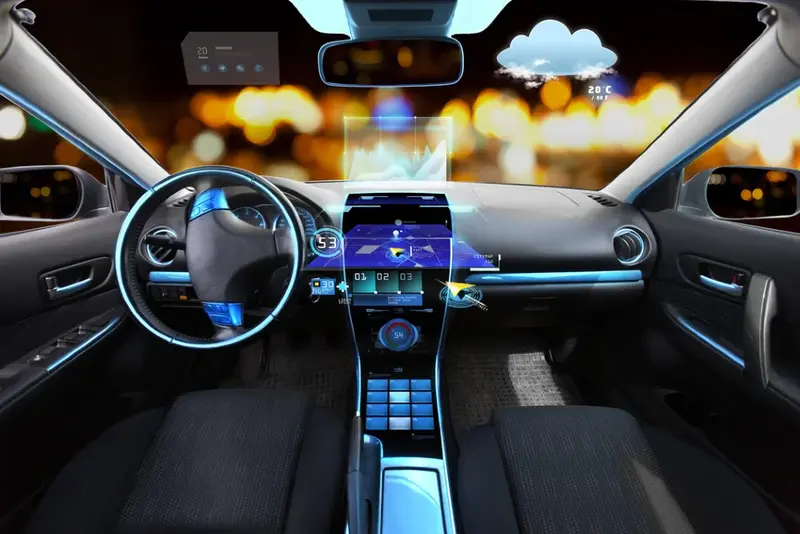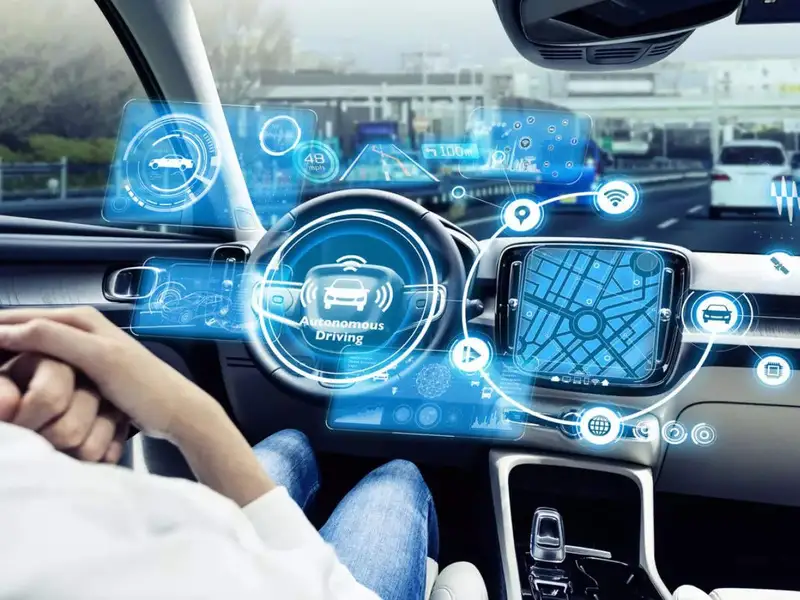Quick Link
Without a doubt, smart cars will transform driving, interacting with automobiles, and mobility experiences. A automobile today signifies more advanced state-of-the-art innovations to come up with improved safety, convenience, and connectivity thanks to the continuously accelerating improvements in technology. This blog examines the key elements of automotive technology, including its advantages, difficulties, and promising future.
Smart Car Technology
The goal of smart car technology is to enhance the use, safety, and functionality of automobiles through a series of advancements. Car technology fundamentally entails the integration of multiple digital and electrical technologies to make the vehicle more connected, intelligent, and informed while it is in motion. ADAS, infotainment systems, and vehicle-to-everything connection are a few examples of these technologies.
Components of Smart Car Technology

Advanced driver-assistance systems (ADAS): ADAS are devices that help drivers with a variety of activities, such as parking, maintaining a path, and avoiding collisions. They do this by using sensors, cameras, and radar. Blind-spot monitoring, automated emergency braking, and adaptive cruise control are a few of the main components of contemporary ADAS.
Information Display Systems: Most modern smart cars have sophisticated infotainment systems. Through the cars, they offer connectivity, entertainment, and navigation. Touchscreens, speech recognition software, and occasionally even connectivity with phone applications are among the most common of these.
Car-to-Everything (V2X) Communication: The car can connect with various types of infrastructure, including traffic lights, road signs, and other vehicles, thanks to technology. In addition to reducing accidents and providing drivers with real-time traffic updates, this communication would enhance traffic flow.
Technology for Autonomous Driving: Although completely autonomous vehicles are still in development, many automobiles already have some degree of autonomy built in to help the driver with certain driving responsibilities. It integrates sensors to provide features like autonomous parking and hands-free driving.
Integration of IoT and connectivity: Smart automobiles are progressively connecting to the internet and other gadgets, including IoT-enabled ones. This connectivity facilitates interaction with smart home devices, software updates, and remote vehicle management.
History of Smart Car Technology
There are a number of significant turning points in the history of smart car technology that have contributed to the creation of more sophisticated and useful automobiles.
Early Innovations
The idea of the “smart car” didn’t really take off until the late 20th century, when basic electronic systems like traction control and ABS started to appear in cars. Thus, early inventions provided the foundation upon which more sophisticated technology would later be built.
Emergence of ADAS
The car industry saw a significant rise in safety and convenience with the introduction of increasingly sophisticated systems like adaptive cruise control and lane departure alerts in the early 2000s, thanks to the widespread use of cameras and sensors in the sector.
Rise of Infotainment Systems
As technology developed, infotainment systems were incorporated into smart automobiles as standard equipment. These technologies significantly redesigned the in-car experience to make it more engaging and pleasurable by integrating phone connectivity, media playing, and navigation.
Development of V2X Communication
Then, vehicle-to-everything communication emerged as the next major development in smart car technology. It ensured smooth traffic and road safety by assisting the vehicles in communicating with the infrastructure and one another to prevent any potential accidents.
Semi-Autonomous and Autonomous Vehicles
The development of autonomous driving technology has received a lot of attention in recent years. Cars have frequently pushed the limits of what is possible in automotive technology by implementing semi-autonomous features like hands-free driving and auto-parking, even if completely autonomous vehicles are still undergoing testing and refinement.
Advantages of Smart Car Technology
Numerous advantages of smart automobile technology include increased driving enjoyment, safety, and overall efficiency.
Improved Safety
Increasing driving safety is one of the automotive technology’s most significant advantages. Advanced Driver Assistance Systems, often known as ADAS, alert drivers to potential collisions, encourage them to stay in their correct lane, and assist them in navigating other difficult driving situations. When driving in challenging conditions, features like adaptive cruise control and automatic emergency braking can lower the chance of collisions and offer additional support.
More Convenience
Such cars offer convenience features that allow one to drive without much bother. Infotainment systems enable people to interact, travel, and enjoy entertainment while on the go, keeping them informed and connected. Furthermore, technologies like hands-free driving and automated parking make it simpler for drivers to navigate confined spaces and less stressful to drive in cities.
Better Efficiency
Efficiency is increased by smart automobile technology in a variety of ways. For instance, V2X communication can help with traffic flow and congestion reduction, and adaptive cruise control can maintain a driver at ideal speeds for both gas efficiency and cruise control. Furthermore, real-time traffic information is updated in smart cars, allowing drivers to plan their routes more intelligently and avoid traffic jams.
Seamless connectivity
Thus, to easily communicate with other cars, infrastructure, and gadgets, a smart car combines IoT and connectivity technologies. As a result, additional connectivity features are made available, including smart home integration, remote vehicle management, and software updates. For instance, the driver might remotely check the battery levels, start the car, and receive maintenance requirements notifications.
Future Proofing
Over time, as technology advances and consumer preferences shift, smart car technology will also adapt. This means that in order to stay current, software upgrades and possibly new features will be required.
Challenges Issues and Considerations
While there are many benefits to smart car technology, there are also a number of issues and concerns that need to be taken into account.
Privacy and Security Concerns
With the latest technology developments in vehicle management, connectivity—one of the extra benefits of smart cars—raises privacy concerns. The issue of whether information collected and sent by motor vehicles can be compromised or accessed by unauthorised parties has come to light. Therefore, implementing strong cyber security measures and safeguarding user data become crucial in attempting to address these issues.
Cost and Accessibility
Intelligent vehicle technology can be very costly, both in terms of initial cost and ongoing upkeep. Some users may not be able to afford the price of sophisticated features and systems, raising concerns about affordability and accessibility.
Regulatory and Legal Issues
There are significant legal ramifications and strict regulations around the development and application of this autonomous driving technology. Hence, it goes without saying that the technology within the autonomous vehicles should be brought in line with the essential traffic rules, and its safety conformance as per requirements will decide on its extensive reach. In addition, legal frameworks outlining culpabilities in the event of an accident must be constructed.
Technological Reliability
Despite the fact that smart car technology has advanced significantly in recent years, concerns about its dependability and efficiency still exist. The effectiveness of intelligent features and systems would be compromised by any malfunctioning of sensors, software, or system constraints.
Integration with Existing Infrastructure
Like all other smart car technologies, V2X communication success depends on how effectively it integrates with the current infrastructure. It is true that in order to fully utilise the potential of smart car technology, updating the infrastructure for highways with communication networks would be necessary.
Future of Smart Car Technology

As technology advances, the future of smart car technology will be even more exciting and transformative. Following are some trends and developments to watch:
Autonomous Driving Advances
With the help of AI, sensors, machine learning, and other technologies, the development of completely autonomous vehicles will only continue to advance. We anticipate a considerably wider spread of self-driving cars and likely answers to new mobility thanks to growing technology.
Greater connectivity and IoT integration
More automation and connectivity will be possible thanks to the increasingly complex way that smart cars and the Internet of Things are integrated. Vehicles and connected gadgets such as traffic management systems and smart home systems will be able to communicate with each other without any problems in the future.
Sustainable and Green Technologies
Reduced environmental impact and sustainability are the two main development trends in the automotive sector. A significant portion of these will probably be added to smart car technology through environmentally friendly features including electric drives, energy-saving technologies, and materials that support sustainable development.
Evolution of ADAS (Advanced Driver-Assistance Systems)
Advanced capabilities and functionalities will be presented by ADAS technology as it continues to develop. More safety and convenience will be added in the future thanks to adaptive driving modes, collision avoidance system improvements, and augmented reality head-up displays.
Personalization and Customization
In the future, drivers of smart cars may have a more tailored and personalised experience. Drivers can customise the features, settings, and preferences of their vehicles to reflect their unique personalities. These would include highly customisable driver assistance settings, adaptive climate management, and genuinely personalised infotainment options.
The largest advancement in the auto business is the technology found in smart cars, which offer a support system that further guarantees efficiency, security, and convenience. Smart cars are changing the way people interact with cars and experience mobility. From advanced infotainment and driver assistance features to autonomous driving and connectivity, these cars are revolutionising the automotive industry.
Well, given how quickly technology is continuously developing, smart car technology may get much better in the future. The continued advancement of smart car technology has the potential to greatly enhance driver experience and further influence the direction of transportation, despite obstacles and concerns.
At autoearn, we make an effort to keep you informed about the most recent developments and trends in the field of smart automobile technology. As we continue to explore this exciting realm of automotive innovation, we’ll keep you informed.
For more content like this visit for online earning blogs visit autoearn or visit our Fcaebook page.

